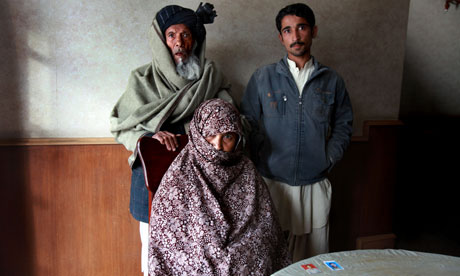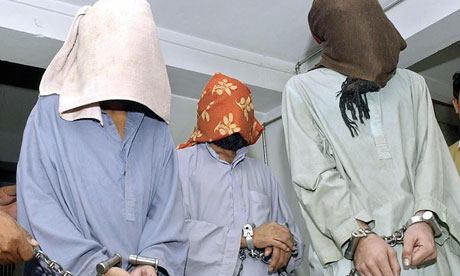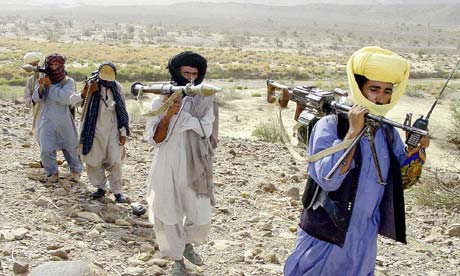In Balochistan, mutilated corpses bearing the signs of torture keep turning up, among them lawyers, students and farm workers. Why is no one investigating and what have they got to do with the bloody battle for Pakistan's largest province?

The bodies surface quietly, like corks bobbing up in the dark. They come in twos and threes, a few times a week, dumped on desolate mountains or empty city roads, bearing the scars of great cruelty. Arms and legs are snapped; faces are bruised and swollen. Flesh is sliced with knives or punctured with drills; genitals are singed with electric prods. In some cases the bodies are unrecognisable, sprinkled with lime or chewed by wild animals. All have a gunshot wound in the head.
This gruesome parade of corpses has been surfacing in Balochistan,Pakistan's largest province, since last July. Several human rights groups, including Amnesty International, have accounted for more than 100 bodies – lawyers, students, taxi drivers, farm workers. Most have been tortured. The last three were discovered on Sunday.
If you have not heard of this epic killing spree, though, don't worry: neither have most Pakistanis. Newspaper reports from Balochistan are buried quietly on the inside pages, cloaked in euphemisms or, quite often, not published at all.
The forces of law and order also seem to be curiously indifferent to the plight of the dead men. Not a single person has been arrested or prosecuted; in fact, police investigators openly admit they are not even looking for anyone. The stunning lack of interest in Pakistan's greatest murder mystery in decades becomes more understandable, however, when it emerges that the prime suspect is not some shady gang of sadistic serial killers, but the country's powerful military and its unaccountable intelligence men.
This is Pakistan's dirty little war. While foreign attention is focused on theTaliban, a deadly secondary conflict is bubbling in Balochistan, a sprawling, mineral-rich province along the western borders withAfghanistan and Iran. On one side is a scrappy coalition of guerrillas fighting for independence from Pakistan; on the other is a powerful army that seeks to quash their insurgency with maximum prejudice. The revolt, which has been rumbling for more than six years, is spiced by foreign interests and intrigues – US spy bases, Chinese business, vast underground reserves of copper, oil and gold.
And in recent months it has grown dramatically worse. At the airport in Quetta, the provincial capital, a brusque man in a cheap suit marches up to my taxi with a rattle of questions. "Who is this? What's he doing here? Where is he staying?" he asks the driver, jerking a thumb towards me. Scribbling the answers, he waves us on. "Intelligence," says the driver.
The city itself is tense, ringed by jagged, snow-dusted hills and crowded with military checkposts manned by the Frontier Corps (FC), a paramilitary force in charge of security. Schools have recently raised their walls; sand-filled Hesco barricades, like the ones used in Kabul and Baghdad, surround the FC headquarters. In a restaurant the waiter apologises: tandoori meat is off the menu because the nationalists blew up the city's gas pipeline a day earlier. The gas company had plugged the hole that morning, he explains, but then the rebels blew it up again.
The home secretary, Akbar Hussain Durrani, a neatly suited, well-spoken man, sits in a dark and chilly office. Pens, staplers and telephones are neatly laid on the wide desk before him, but his computer is blank. The rebels have blown up a main pylon, he explains, so the power is off. Still, he insists, things are fine. "The government agencies are operating in concert, everyone is acting in the best public interest," he says. "This is just a . . . political problem." As we speak, a smiling young man walks in and starts to take my photo; I later learn he works for the military's Inter-Services Intelligence (ISI) spy agency.
We cut across the city, twisting through the backstreets, my guide glancing nervously out the rear window. The car halts before a tall gate that snaps shut behind us. Inside, a 55-year-old woman named Lal Bibi is waiting, wrapped in a shawl that betrays only her eyes, trembling as she holds forth a picture of her dead son Najibullah. The 20-year-old, who ran a shop selling motorbike parts, went missing last April after being arrested at an FC checkpost, she says. His body turned up three months later, dumped in a public park on the edge of Quetta, badly tortured. "He had just two teeth in his mouth," she says in a voice crackling with pain. She turns to her father, a turbaned old man sitting beside her, and leans into his shoulder. He grimaces.
 Suspected members of the Baloch Liberation Army are paraded by Pakistani police. Photograph: Banaras Khan/AFP/Getty Images
Suspected members of the Baloch Liberation Army are paraded by Pakistani police. Photograph: Banaras Khan/AFP/Getty ImagesBibi says her family was probably targeted for its nationalist ties – Najibullah's older brother, now dead, had joined the "men in the mountains" years earlier, she says. Now a nephew, 28-year-old Maqbool, is missing. She prays for him, regularly calling the hospitals for any sign of him and, occasionally, the city morgues.
Over a week of interviews in Karachi and Quetta, I meet the relatives of seven dead men and nine "disappeared" –men presumed to have been abducted by the security forces. One man produces a mobile phone picture of the body of his 22-year-old cousin, Mumtaz Ali Kurd, his eyes black with swelling and his shirt drenched in blood. A relative of Zaman Khan, one of three lawyers killed in the past nine months, produces court papers. A third trembles as he describes finding his brother's body in an orchard near Quetta.
Patterns emerge. The victims were generally men between 20 and 40 years old – nationalist politicians, students, shopkeepers, labourers. In many cases they were abducted in broad daylight – dragged off buses, marched out of shops, detained at FC checkposts – by a combination of uniformed soldiers and plain-clothes intelligence men. Others just vanished. They re-emerge, dead, with an eerie tempo – approximately 15 bodies every month, although the average was disturbed last Saturday when eight bodies were found in three locations across Balochistan.
Activists have little doubt who is behind the atrocities. Human Rights Watch says "indisputable" evidence points to the hand of the FC, the ISI and its sister agency, Military Intelligence. A local group, Voice for Missing Persons, says the body count has surpassed 110. "This is becoming a state of terror," says its chairman, Naseerullah Baloch.
The army denies the charges, saying its good name is being blemished by impersonators. "Militants are using FC uniforms to kidnap people and malign our good name," says Major General Obaid Ullah Khan Niazi, commander of the 46,000 FC troops stationed in Balochistan. "Our job is to enforce the law, not to break it."
Despairing relatives feel cornered. Abdul Rahim, a farmer wearing a jewelled skullcap, is from Khuzdar, a hotbed of insurgent violence. He produces court papers detailing the abduction of his son Saadullah in 2009. First he went to the courts but then his lawyer was shot dead. Then he went to the media but the local press club president was killed. Now, Rahim says, "nobody will help in case they are targeted too. We are hopeless."
Balochistan has long been an edgy place. Its vast, empty deserts and long borders are a magnet for provocateurs of every stripe. Taliban fighters slip back and forth along the 800-mile Afghan border; Iranian dissidents hide inside the 570-mile frontier with Iran. Drug criminals cross the border from Helmand, the world's largest source of heroin, on their way to Iran or lonely beaches on the Arabian Sea. Wealthy Arab sheikhs fly into remote airstrips on hunting expeditions for the houbara bustard, a bird they believe improves their lovemaking. At Shamsi, a secretive airbase in a remote valley in the centre of the province, CIA operatives launch drones that attack Islamists in the tribal belt.
The US spies appreciate the lack of neighbours – Balochistan covers 44% of Pakistan yet has half the population of Karachi. The province's other big draw is its natural wealth. At Reko Diq, 70 miles from the Afghan border, a Canadian-Chilean mining consortium has struck gold, big-time. The Tethyan company has discovered 4bn tonnes of mineable ore that will produce an estimated 200,000 tonnes of copper and 250,000 ounces of gold per year, making it one of the largest such mines in the world. The project is currently stalled by a tangled legal dispute, but offers a tantalising taste of Balochistan's vast mineral riches, which also includes oil, gas, platinum and coal. So far it is largely untapped, though, and what mining exists is scrappy and dangerous. On 21 March,50 coal workers perished in horrific circumstances when methane gas flooded their mine near Quetta, then catastrophically exploded.
Two conflicts are rocking the province. North of Quetta, in a belt of land adjoining the Afghan border, is the ethnic Pashtun belt. Here, Afghan Taliban insurgents shelter in hardline madrasas and lawless refugee camps, taking rest in between bouts of battle with western soldiers in Afghanistan. It is home to the infamous "Quetta shura", the Taliban war council, and western officials say the ISI is assisting them. Some locals agree. "It's an open secret," an elder from Kuchlak tells me. "The ISI gave a fleet of motorbikes to local elders, who distributed them to the fighters crossing the border. Nobody can stop them."
The other conflict is unfolding south of Quetta, in a vast sweep that stretches from the Quetta suburbs to the Arabian Sea, in the ethnic Baloch and Brahui area, whose people have always been reluctant Pakistanis. The first Baloch revolt erupted in 1948, barely six months after Pakistan was born; this is the fifth. The rebels are splintered into several factions, the largest of which is the Balochistan Liberation Army. They use classic guerrilla tactics – ambushing military convoys, bombing gas pipelines, occasionally lobbing rockets into Quetta city. Casualties are relatively low: 152 FC soldiers died between 2007 and 2010, according to official figures, compared with more than 8,000 soldiers and rebels in the 1970s conflagration.
But this insurgency seems to have spread deeper into Baloch society than ever before. Anti-Pakistani fervour has gripped the province. Baloch schoolchildren refuse to sing the national anthem or fly its flag; women, traditionally secluded, have joined the struggle. Universities have become hotbeds of nationalist sentiment. "This is not just the usual suspects," says Rashed Rahman, editor of the Daily Times, one of few papers that regularly covers the conflict.
At a Quetta safehouse I meet Asad Baloch, a wiry, talkative 22-year-old activist with the Baloch Students' Organisation (Azad). "We provide moral and political support to the fighters," he says. "We are making people aware. When they are aware, they act." It is a risky business: about one-third of all "kill and dump" victims were members of the BSO.
Baloch anger is rooted in poverty. Despite its vast natural wealth, Balochistan is desperately poor – barely 25% of the population is literate (the national average is 47%), around 30% are unemployed and just 7% have access to tap water. And while Balochistan provides one-third of Pakistan's natural gas, only a handful of towns are hooked up to the supply grid.
The insurgents are demanding immediate control of the natural resources and, ultimately, independence. "We are not part of Pakistan," says Baloch.
 Well-armed Baloch insurgents in the contested region south of the capital Quetta. Photograph: Banaras Khan/AFP
Well-armed Baloch insurgents in the contested region south of the capital Quetta. Photograph: Banaras Khan/AFPHis phone rings. News comes through that another two bodies have been discovered near the coast. One, Abdul Qayuum, was a BSO activist. Days later, videos posted on YouTube show an angry crowd carrying his bloodied corpse into a mortuary. He had been shot in the head.
The FC commander, Maj Gen Niazi, wearing a sharp, dark suit and with neatly combed hair (he has just come from a conference) says he has little time for the rebel demand. "The Baloch are being manipulated by their leaders," he says, noting that the scions of the main nationalist groups live in exile abroad – Hyrbyair Marri in London; Brahamdagh Bugti in Geneva. "They are enjoying the life in Europe while their people suffer in the mountains," he says with a sigh.
Worse again, he adds, they were supported by India. The Punjabi general offers no proof for his claim, but US and British intelligence broadly agree, according to the recent WikiLeaks cables. India sees Balochistan as payback for Pakistani meddling in Kashmir – which explains why Pakistani generals despise the nationalists so much. "Paid killers," says Niazi. He vehemently denies involvement in human rights violations. "To us, each and every citizen of Balochistan is equally dear," he says.
Civilian officials in the province, however, have another story. Last November, the provincial chief minister, Aslam Raisani, told the BBC that the security forces were "definitely" guilty of some killings; earlier this month, the province's top lawyer, Salahuddin Mengal, told the supreme court the FC was "lifting people at will". He resigned a week later.
However, gross human rights abuses are not limited to the army. As the conflict drags on, the insurgents have become increasingly brutal and ruthless. In the past two years, militants have kidnapped aid workers, killed at least four journalists and, most disturbingly, started to target "settlers" – unarmed civilians, mostly from neighbouring Punjab, many of whom have lived in Balochistan for decades. Some 113 settlers were killed in cold blood last year, according to government figures – civil servants, shopkeepers, miners. On 21 March, militants riding motorbikes sprayed gunfire into a camp of construction workers near Gwadar, killing 11; the Baloch Liberation Front claimed responsibility. Most grotesque, perhaps, are the attacks on education: 22 school teachers, university lecturers and education officials have been assassinated since January 2008, causing another 200 to flee their jobs.
As attitudes harden, the middle ground is being swept away in tide of bloodshed. "Our politicians have been silenced," says Habib Tahir, a human rights lawyer in Quetta. "They are afraid of the young." I ask a student in Quetta to defend the killing of teachers. "They are not teachers, they work for the intelligence agencies," one student tells me. "They are like thieves coming into our homes. They must go."
The Islamabad government seems helpless to halt Balochistan's slide into chaos. Two years ago, President Asif Ali Zardari announced a sweeping package of measures intended to assuage Baloch grievances, including thousands of jobs, a ban on new military garrisons and payment of $1.4bn (£800m) in overdue natural gas royalties. But violence has hijacked politics, the plan is largely untouched, and anaemic press coverage means there is little outside pressure for action.
Pakistan's foreign allies, obsessed with hunting Islamists, have ignored the problem. "We are the most secular people in the region, and still we are being ignored," says Noordin Mengal, who represents Balochistan on the UN Human Rights Council in Geneva.
In this information vacuum, the powerful do as they please. Lawyer Kachkol Ali witnessed security forces drag three men from his office in April 2009. Their bodies turned up five days later, dead and decomposed. After telling his story to the press, Ali was harassed by military intelligence, who warned him his life was in danger. He fled the country. "In Pakistan, there is only rule of the jungle," he says by phone from Lørenskog, a small Norwegian town where he won asylum last summer. "Our security agencies pick people up and treat them like war criminals," he says. "They don't even respect the dead."
Balochistan's dirty little war pales beside Pakistan's larger problems – the Taliban, al-Qaida, political upheaval. But it highlights a very fundamental danger – the ability of Pakistanis to live together in a country that, under its Islamic cloak, is a patchwork of ethnicities and cultures. "Balochistan is a warning of the real battle for Pakistan, which is about power and resources," says Haris Gazdar, a Karachi-based researcher. "And if we don't get it right, we're headed for a major conflict."
Before leaving Quetta I meet Faiza Mir, a 36-year-old lecturer in international relations at Quetta's Balochistan University. Militants have murdered four of her colleagues in the past three years, all because they were "Punjabi". Driving on to the campus, she points out the spots where they were killed, knowing she could be next.
"I can't leave," says Mir, a sparky woman with an irrepressible smile. "This is my home too." And so she engages in debate with students, sympathising with their concerns. "I try to make them understand that talk is better than war," she says.
But some compromises are impossible. Earlier on, students had asked Mir to remove a portrait of Muhammad Ali Jinnah, Pakistan's founding father, from her office wall. Mir politely refused, and Jinnah – an austere lawyer in a Savile Row suit - still stares down from her wall.
But how long will he stay there? "That's difficult to say," she answers.
Related
29 Mar 2011
4 Feb 2009
3 Jul 2010
29 Sep 2001



















